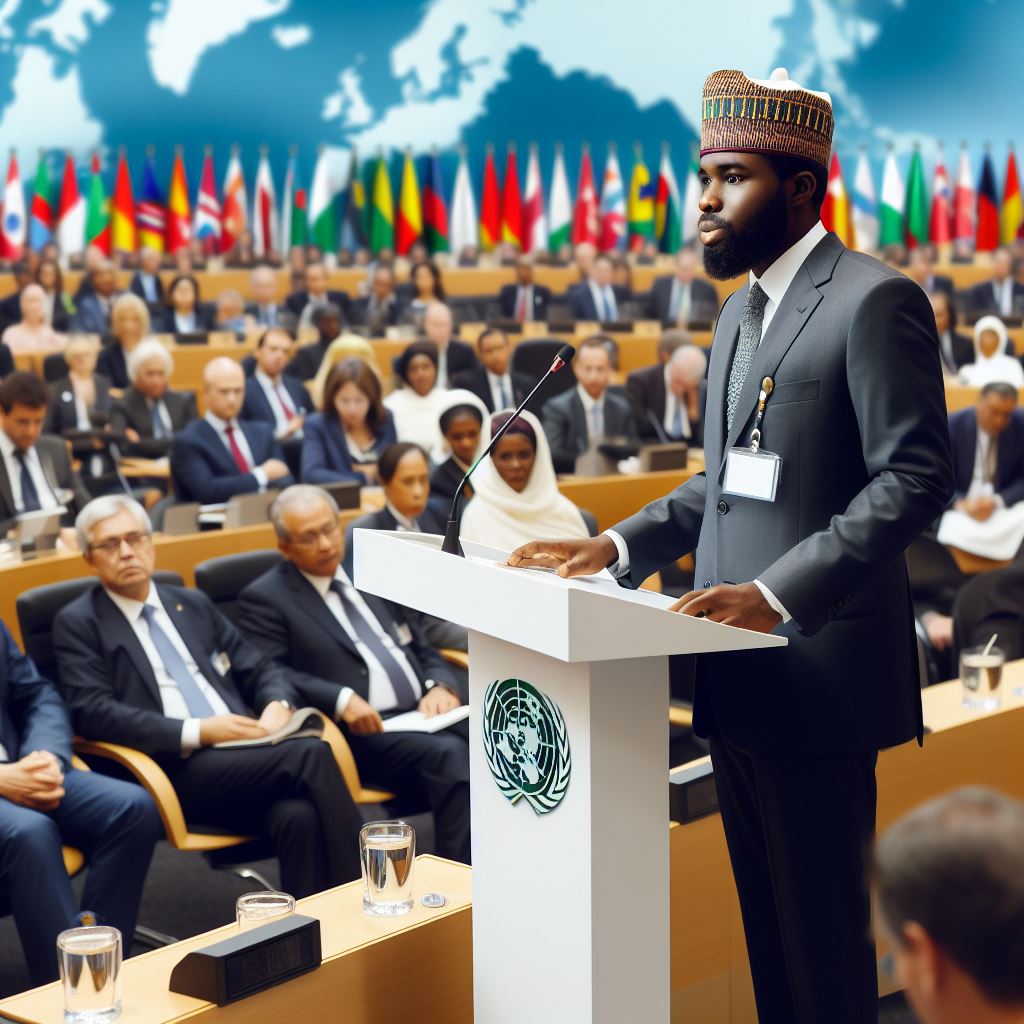Introduction
This blog chapter will explore the key Theoretical Approaches in International Relations Curriculum.
Nigeria’s international relations curriculum plays a crucial role in shaping future leaders.
The curriculum focuses on political, economic, and social aspects.
Theoretical Approaches in International Relations Curriculum provide a comprehensive understanding of global politics.
Realism
Realism is one of the primary theoretical approaches taught in Nigerian international relations curriculum.
It emphasizes the pursuit of national interests and the importance of power in international relations.
It highlights the competition and conflict between states as the fundamental drivers of international politics.
Through realism, Nigerian students gain insights into the challenges and complexities of global affairs.
Liberalism
Liberalism is another key theoretical approach integrated into the Nigerian international relations curriculum.
It promotes cooperation, interdependence, and the role of institutions in fostering peace and development.
It emphasizes the importance of democracy, human rights, and collective security in global governance.
By studying liberalism, Nigerian students develop a broader understanding of ethical and normative aspects of international relations.
Constructivism
Constructivism is an essential theoretical approach taught in the Nigerian international relations curriculum.
It emphasizes the role of ideas, norms, and social structures in shaping international relations.
It highlights the significance of identity, culture, and historical context on state behavior.
Through constructivism, Nigerian students gain a critical perspective on how shared beliefs and values influence global dynamics.
In essence, the Nigerian international relations curriculum provides a comprehensive understanding of key theoretical approaches.
Realism, liberalism, and constructivism equip Nigerian students with the necessary analytical tools to navigate the complex world of international relations.
By studying these approaches, Nigerian students develop critical thinking and problem-solving skills essential for future leadership roles.
Overall, the curriculum aims to produce well-rounded individuals who can contribute positively to global affairs.
Background
Definition and Importance of International Relations Curriculum in Nigeria
In Nigeria, the international relations curriculum refers to the structured educational program that focuses on understanding and analyzing interactions between states, non-state actors, and global issues.
Studying international relations is crucial for Nigeria due to its position as a prominent African nation, with vast diplomatic engagements and global interests.
The curriculum provides students with a comprehensive understanding of the complex dynamics that shape Nigeria’s foreign policy and international interactions.
By delving into various theoretical approaches, students develop critical thinking skills and gain insights into global affairs.
Moreover, the international relations curriculum equips students with the necessary knowledge to serve in Nigeria’s foreign service, international organizations, and diplomatic corps.
Brief History and Development of International Relations Studies in Nigeria
International relations studies in Nigeria have evolved over time, reflecting the changing global landscape and Nigeria’s own historical experiences.
The discipline gained prominence in the 1960s as Nigeria gained independence and faced the challenges of nation-building and diplomatic engagements.
Initially, international relations courses were offered as part of political science programs.
However, recognizing the significance of the discipline, dedicated international relations programs were established in universities.
The development of international relations studies was further accelerated during the post-Cold War era, as globalization and regional integration became prominent forces.
Nigerian scholars and experts in the field continuously strive to contextualize international relations theories to address Nigeria’s unique challenges and perspectives.
Key Institutions and Universities Offering International Relations Programs
In Nigeria, several institutions and universities offer international relations programs both at undergraduate and postgraduate levels.
Notably, the University of Lagos (UNILAG) has a renowned Department of International Relations and Strategic Studies.
The department offers comprehensive courses on international relations and strategically aligns its curriculum with global trends and developments.
Furthermore, Obafemi Awolowo University (OAU), Ahmadu Bello University (ABU), and the University of Ibadan (UI) are prestigious institutions known for their international relations programs.
These institutions impart necessary skills and knowledge through a combination of theoretical education, seminars, research, and practical exposure.
Additionally, the Nigerian Institute of International Affairs and the Nigerian Foreign Service Academy contribute to shaping the international relations curriculum through their training programs.
Through collaborations with foreign institutions and academic exchanges, Nigerian universities continually enhance their curriculum and expose students to diverse perspectives.
In fact, the international relations curriculum in Nigeria plays a vital role in equipping students with the necessary understanding and skills to navigate the complex global arena.
Through its comprehensive and ever-evolving curriculum, Nigeria continues to produce competent diplomats and professionals who contribute to national and global affairs.
Transform Your Career with Expert Guidance
Get personalized mentorship consulting that’s tailored to your unique path. Our expert advice is actionable and exclusive.
Get StartedRead: Nigeria’s Role in Global Politics: An International Relations Lens
Realism
Definition and overview of realism in international relations
Realism is a dominant theoretical approach in international relations that emphasizes state-centric behavior.
It argues that states are the primary actors in the global arena, driven by the pursuit of power and national interests.
Realism focuses on the competitive nature of international politics and the absence of a central authority.
States are motivated by self-preservation and are inherently skeptical of cooperation or trust.
The relevance and applications of realism in Nigerian international relations curriculum
Realism is highly relevant to Nigerian international relations curriculum due to its emphasis on power dynamics.
In a dynamic and competitive global environment, Nigeria must understand the strategic interests of other nations.
Realism helps Nigeria analyze the behavior and motives of other states, leading to better foreign policy decisions.
It provides a framework for Nigeria to protect and advance its national interests in an anarchic international system.
Critiques and challenges faced by realism in understanding Nigerian international relations
Realism’s state-centric approach overlooks the important role of non-state actors in international relations.
In Nigeria, non-state actors such as ethnic groups, NGOs, and multinational corporations play significant roles.
Realism’s focus on power and self-interest may limit cooperation and hinder Nigeria’s ability to address global challenges.
It neglects other factors such as culture, ideology, and historical grievances, which shape Nigeria’s international relations.
Nigeria’s diverse domestic and regional dynamics challenge the simplistic assumptions of realism.
Realism’s pessimistic view of international cooperation may hinder Nigeria’s efforts to build alliances and promote peace.
It fails to account for the increasing influence of non-traditional security threats, such as climate change and terrorism.
In short, realism offers valuable insights into Nigerian international relations curriculum, but it must be complemented with other theoretical approaches to provide a more holistic understanding.
While realism’s focus on power and self-interest is important, addressing the challenges faced by Nigeria requires considering non-state actors, cultural factors, and the need for cooperation in solving global issues.
Read: Skill Sets Every Diplomacy Student in Nigeria Should Develop
Liberalism
Definition and overview of liberalism in international relations
Liberalism is an international relations theory that emphasizes cooperation, interdependence, and the role of institutions.
It believes in the importance of free trade, human rights, democracy, and individual liberty.
Liberalism focuses on the potential for peaceful resolutions to conflicts through diplomacy and negotiation.
It also recognizes the impact of globalization and the need for multilateral approaches in solving global issues.
The relevance and applications of liberalism in Nigerian international relations curriculum
Liberalism is relevant in Nigerian international relations curriculum because it promotes democratic governance.
It emphasizes the protection of human rights, which is crucial in a diverse society like Nigeria.
Liberalism encourages economic development through free trade and entrepreneurship.
It supports the idea of international cooperation to address global challenges such as climate change and terrorism.
Critiques and challenges faced by liberalism in understanding Nigerian international relations
Liberalism is often criticized for being too idealistic and overlooking power dynamics between nations.
Critics argue that it fails to address inequalities in the international system that disadvantage developing countries like Nigeria.
Some question the universal applicability of liberal values and argue that they may not align with certain cultural or religious beliefs in Nigeria.
Liberalism faces challenges in implementing its principles due to the presence of corruption and weak institutions in Nigeria.
Liberalism offers valuable insights in understanding Nigerian international relations by emphasizing cooperation, democracy, and human rights.
However, it also faces critiques and challenges that need to be addressed for a comprehensive understanding of the subject matter.
Read: Comparing International Relations Curricula: Nigeria vs. the World

Constructivism
Definition and overview of constructivism in international relations
Constructivism is a theoretical approach that emphasizes the role of ideas, norms, and beliefs in shaping international relations.
It argues that actors in the international system are not solely influenced by material interests, but also by socially constructed identities and shared values.
Constructivists highlight the importance of language, discourse, and social interactions in shaping international relations.
This approach challenges traditional realist and liberal theories, which focus on material factors and systemic constraints.
In constructivism, individuals and non-state actors play significant roles in shaping the international system.
The relevance and applications of constructivism in Nigerian international relations curriculum
Constructivism is highly relevant in the Nigerian international relations curriculum.
It helps explain the role of cultural values, historical experiences, and social norms in shaping Nigeria’s foreign policy.
By emphasizing the importance of ideas and identities, constructivism provides a more nuanced understanding of Nigeria’s interactions with other countries.
Constructivism encourages critical thinking and analysis of how Nigerian national identity and historical narratives impact foreign policy decisions.
It also highlights the potential for cooperation, norm diffusion, and cultural exchange in shaping Nigeria’s international relations.
Critiques and challenges faced by constructivism in understanding Nigerian international relations
One major critique of constructivism is its potential for subjective interpretations and lack of empirical evidence.
Some argue that constructivist analysis can be too abstract and lacks clear causal mechanisms.
In the Nigerian context, the dominance of state-centric approaches hinders the integration of constructivism in international relations curriculum.
The focus on material factors and power politics still prevails in Nigerian foreign policy decision-making.
There is a need for more research and empirical studies that demonstrate the practical applications of constructivist insights in Nigerian international relations.
In general, constructivism offers a unique perspective in understanding international relations, including Nigerian foreign policy.
By highlighting the role of ideas, norms, and identities, constructivism provides a more comprehensive understanding of Nigeria’s interactions with the international community.
However, challenges such as the subjective nature of constructivist analysis and the dominance of state-centric approaches in Nigerian foreign policy limit its integration in the curriculum.
Nevertheless, further research and empirical studies can provide concrete evidence of constructivist insights in Nigerian international relations.
Read: Challenges Facing Tourism Education in Nigeria Today
Postcolonialism
Definition and overview of postcolonialism in international relations
Postcolonialism is a theoretical approach that seeks to understand the legacies of colonialism.
It focuses on the power dynamics, cultural, and economic inequalities between former colonizers and colonized.
This approach examines how colonialism has shaped the current global order and international relations.
The relevance and applications of postcolonialism in Nigerian international relations curriculum
Postcolonialism is highly relevant in understanding Nigeria’s historical background and its interactions with the world.
It helps to analyze the effects of British colonialism on Nigeria’s political, economic, and social structures.
Nigerian international relations curriculum can use postcolonialism to deconstruct imperialist narratives.
By incorporating postcolonialism, it allows for a more inclusive and context-specific understanding of Nigeria’s role in the world.
Critiques and challenges faced by postcolonialism in understanding Nigerian international relations
One critique is the tendency to generalize postcolonial experiences across different countries, overlooking their unique histories.
Postcolonialism sometimes neglects the agency and contributions of individuals within colonized societies.
There is also a challenge of balancing the focus on colonialism’s negative impact without undermining local agency and resistance.
Another challenge is the limited scope of postcolonialism in addressing contemporary issues beyond the colonial period.
Feminism
Definition and overview of feminism in international relations
Feminism is a theory that seeks to examine and challenge social, political, and economic inequalities between genders.
In the context of international relations, feminism focuses on uncovering the patriarchal nature of the global order and its impacts on women.
Feminist scholars highlight the need to include gender as a crucial analytical category in understanding international relations.
They argue that dominant theories fail to address women’s experiences and often perpetuate gender-based hierarchies.
The relevance and applications of feminism in Nigerian international relations curriculum
Integrating feminism into the Nigerian international relations curriculum is essential as it provides a comprehensive understanding of power dynamics, human rights, and social justice. It challenges the existing male-centric narratives and offers fresh perspectives.
Feminism enables students to critically analyze how gender shapes diplomatic, economic, and security issues in Nigeria’s international relations.
It highlights the role of women in diplomacy, peacebuilding, and development, which is often overlooked.
Furthermore, incorporating feminist perspectives into the curriculum encourages students to question societal norms and inequalities.
It fosters empathy, global citizenship, and a commitment to promoting gender equality within Nigerian society and beyond.
Critiques and challenges faced by feminism in understanding Nigerian international relations
Feminism in Nigerian international relations faces critiques and challenges that hinder its full understanding and integration.
Some argue that feminism oversimplifies complex issues, disregards cultural and religious differences, and neglects intersectionality.
Additionally, traditional gender roles deeply rooted in Nigerian society pose barriers to the adoption of feminism in international relations.
Resistance from conservative elements may limit the inclusion of feminist theories in the curriculum, perpetuating gender inequalities and hindering progress.
Moreover, access to resources and lack of representation of female scholars in academia present obstacles for the advancement of feminist perspectives in Nigerian international relations.
This hampers the development of diverse and inclusive knowledge within the field.
In review, feminism offers a valuable lens through which to analyze Nigerian international relations.
It sheds light on gender-based inequalities, amplifies marginalized voices, and challenges dominant narratives.
Integrating feminist perspectives into the curriculum can cultivate critical thinking skills and promote gender equality in Nigeria’s global engagements.
However, overcoming critiques and challenges requires a collective effort to address cultural barriers, ensure access to resources, and elevate female scholars’ visibility.
By doing so, Nigeria’s international relations curriculum can become more inclusive, accurate, and transformative.
Conclusion
Key Theoretical Approaches in Nigerian International Relations Curriculum
The Nigerian international relations curriculum embodies diverse theoretical frameworks.
Realism, stressing power dynamics, dominates foundational teachings.
Neorealism, a subset, emphasizes the anarchic nature of the international system, crucial in shaping Nigeria’s foreign policy.
Moving beyond power-centric ideologies, Liberalism’s advocacy for cooperation and institutions influences diplomatic strategies.
Constructivism, relatively new, focuses on shared beliefs, norms, and identities shaping international relations. These theories form the bedrock, guiding students in understanding global dynamics.
Importance of Incorporating Multiple Theoretical Perspectives
Understanding the multifaceted global landscape necessitates embracing various theoretical lenses.
Nigeria’s role in the international arena demands a nuanced approach.
By incorporating diverse perspectives, students gain a comprehensive understanding.
This inclusive education prepares future diplomats and policymakers to navigate complexities adeptly.
It fosters critical thinking and analytical skills, pivotal in addressing global challenges.
Employing a mosaic of theories ensures a holistic approach to international relations education.
Ending Thoughts and Future Prospects of Nigerian International Relations Curriculum
As the world evolves, so should academic approaches in Nigerian international relations.
Future prospects lie in further diversifying theoretical frameworks.
Incorporating emerging theories like feminism, postcolonialism, and critical theory enriches the curriculum.
Additionally, integrating practical experiences through internships and case studies enhances students’ practical skills.
Collaboration with international institutions and scholars enriches the discourse.
Embracing technology advances allows for a globalized learning environment, breaking geographical barriers.
Ultimately, nurturing a dynamic curriculum ensures Nigeria remains adept in global affairs.
The Nigerian international relations curriculum evolves to meet contemporary challenges.
Its foundation on realism, liberalism, neorealism, and constructivism remains robust. Incorporating multiple theories enriches perspectives and hones critical thinking.
Future prospects involve diversification, practical experiences, and technological integration.
By embracing these elements, Nigeria cultivates a cadre of adept global diplomats and policymakers, ready to shape the future of international relations.




